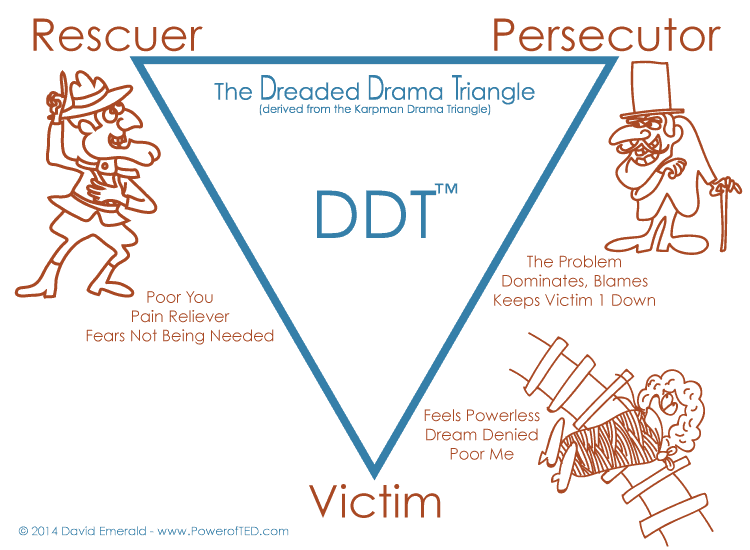From Drama to Empowerment: Healthy Alternatives to Karpman's Triangle
A few weeks ago, in a two-part series, I introduced the concept of Karpman’s “Dreaded Drama Triangle” and offered some tips for escaping from it.
Today I want to revisit Karpman’s Triangle (can you tell it’s one of my most popular topics?!) and talk about an approach for transforming it to a healthier alternative.
This is based on the work of David Emerald. In his book, The Power of TED (you can watch a summary of Emerald’s book here), Emerald suggests that one way to dissolve the dreaded drama triangle is to transform our roles on the triangle.
In his visualization:
Victim becomes Creator
Persecutor becomes Challenger
Rescuer becomes Coach.
What does this look like, exactly? Check it out:
Victim → Creator
When we take on a Victim role, we tend to emphasize the idea that we are subject to external forces -- whether that’s bad luck or bad people -- and feel we don’t have any power to change our situation. In other words, in the Victim role, we focus on problems.
A Creator instead tries to focus on problem solving. This is an intention-directed mindset where we own our power -- even if that is only the power of choosing our response to our life circumstances. A Creator envisions a desired outcome and then moves toward that outcome.
Here are some concrete steps you can take to shift your mindset from Victim to Creator:
Instead of tallying the circumstances that are keeping you down, think of what would be better. Literally, make a written list of the results you’d like to achieve.
Brainstorm the actions needed to achieve these goals by yourself. Which of these actions can you take on your own?
Now make a list of obstacles that might keep you from achieving these goals, and consider how you might remove these.
Take steps - however small - in the direction of your goals.
Rescuer → Coach
When we assume the Rescuer role, we tend to overestimate our responsibility for the situations of others. We feel like we have the answers to the Creator’s (a Victim in our mind) problems and want to control or change that person’s actions or attitudes. We do things because we assume that the person can’t do it on their own.
A Coach, on the other hand, can use compassion and questions to help a Creator develop their own vision and plans. As Coaches we encourage and support, but we don’t “take on” someone else’s problems as our own.
Here are some steps for shifting from creating dependency to enabling self responsibility:
Accept that the Rescuer role is not selfless. It can be detrimental for the person you are “saving” and for you!
Self-reflect regarding your motives. Are you focusing on the Creator’s problems at the expense of -- even to distract from -- your own? Do you hope that your “Rescuing” will garner you love, attention, respect or a sense of identity?
Entertain the notion that the Creator has the ability to solve their own problems -- and perhaps that they are the only one who can solve their problem.
Instead of providing your solutions, help them uncover their own solutions.
Act as a coach by listening, empowering and encouraging the Creator not to give up, even if they make mistakes.
Persecutor → Challenger
In the Persecutor role we are often mobilized by anger. We tend to become critical and blame the Creator for “making” us angry or upset. By putting others down we avoid owning up to any mistakes.
As Challengers we can still hold a Creator accountable, but consciously “build up” instead of “put down,” not motivated by anger or blame.
Steps to move from blaming to assertiveness.
Make a list of your goals and expectations of others. Are they reasonable?
Express these desires to others without criticizing or intimidating.
At the same time, accept your own responsibility for your situation and your reactions.
Give constructive feedback, and be open to feedback from others.
Each of these shifts involve reflection: becoming more aware of your own behavior, the roles you choose, and how others participate or react to your choices. You want to set boundaries for yourself, give yourself more power over your situation, and take responsibility for yourself. By shifting your mindset and becoming more aware, you can avoid falling into drama and make positive strides toward more harmonious interactions.





